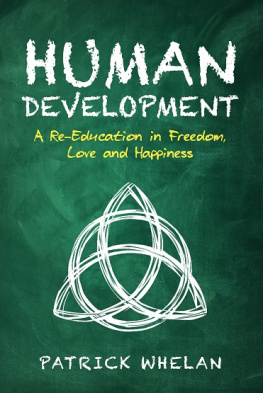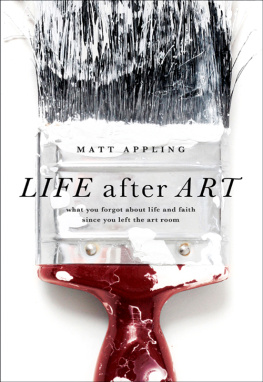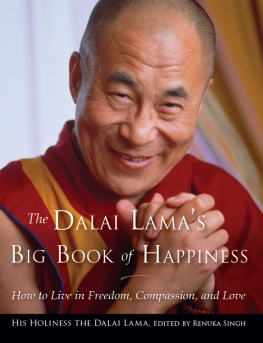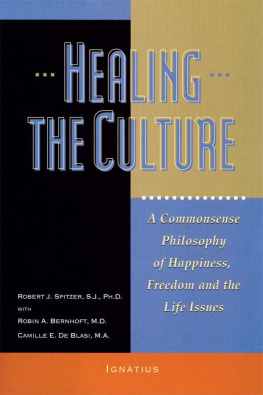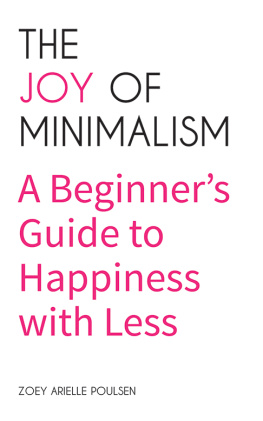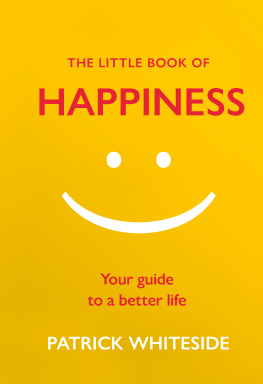Table of Contents
Human Development
A Re-Education in Freedom, Love and Happiness
By Patrick Whelan
Copyright 2021 Patrick Whelan
All rights reserved
ISBN (Print): 9798698295730
No part of this book may be reproduced, or stored in a retrieval system, or transmitted in any form or by any means, electronic, mechanical, photocopying, recording, or otherwise, without express written permission of the author.
Cover design by: Patrick Whelan
Cover edited by: Meng Yuxin
Cover contains elements from Freepik.com
For you, as much as for myself
PART I:Human Development
Breaking the Ice
Life is a gift, a carnival, a playground, a grand adventure, a journey, a banquetenjoy it, live it, explore it, and eat it up. Have these kinds of sayings and the people who say them ever irritated you? Have you ever thought, Thats all well and good for you, but Ive got bills, commitments, obligations, and insecurities. I dont have the money, time, or courage to live life to the fullest?
If you had the chance to repeat your life over againnot to have another chance at life but to actually repeat it, every action, every thought, every emotion, relived, and not once but an infinite number of timeswould you take it? Would you enjoy it? Like a stone in your shoe, would anything stick out that causes you unwanted or unnecessary pain in every reliving? If others could watch your life, would they enjoy it? Would they want to live it?
Friedrich Nietzsche calls this reliving the eternal recurrence. While there are many interpretations of it, I consider it a tool to evaluate and come to terms with your life, as well as to chart a course for your future. If you are happy with who you are now, then you should be able to look back on everything that has happened to you as fortunate, no matter how terrifying or unhappy it was at the time; and everything you did to be right, no matter how wrong it seemed at the time. This is what allowed Nietzsche to coin the phrase, what does not kill me makes me stronger (Twilight of the Idols (1888)). It allows you to learn about cause and effect and to re-evaluate right and wrong, good vs evil, and morality. This also allows you to move forward while considering how your actions will contribute to making you who you further want to become.
The whole notion of identity, of who we are is ill-informed. We are change. If we wanted to say who we are in this moment, we could only list age, physical properties, and immediate motivations. But this is only who we are to strangers. I like to think of identity as a vector, an orientation, with a starting point, a direction, and with actions and experiences as data along the way. If youre a stranger and I tell you about my day, youll learn a tiny bit about who I am, and youd likely get me completely wrong. However, if I told you my life story as well as my goals, youd actually come close to knowing who I am, my vector, and my orientation.
Our vector is constantly changingits sort of a line of best fit. When we only have a few data points, every new experience changes our vector considerably, but as we gain more experience, a solid direction becomes visible. Although it seems like life is happening to us and that our vectors are chosen for us, we can still gain the power to make things happen in our lives, thus changing our vectors and who we are.
Figure 1: Personal Vectors
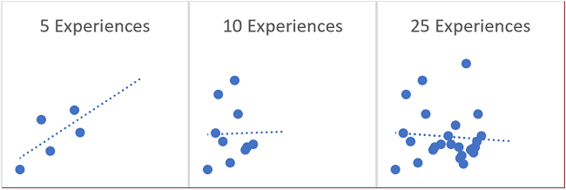
Dont worry, this is the last semblance of anything mathematical youll see in this book. In these graphs, the same five data points, or experiences, in the first graph, are also in the other two graphs. Also, the same ten experiences in the second graph are in the third. So, in the first graph, the line of best fit represents an early estimation of who somebody is, based on an observation of just five experiences. However, as you can see, with additional experiences, the line of best fit, and our estimation of who somebody is, can change drastically. This also means that our future decisions and experiences can change our vectors, and who we are.
Academic psychology treats us like simple machines, with sensory inputs and neurochemical outputs, but we are not machines, we are vectorswe are stories.
- Our settings are the locations and times we live in and our cultures, religions, political and economic climates, and social circles.
- Our plots are the sequences of events that have led us to where we are now, with our most significant experiences highlighted in our memories.
- Our characteristics are our preferences, our attributes, our ambitions, our virtues, and how they have changed over time.
- Our conflicts are all the struggles that weve endured, overcome, or currently face.
- Our themes are our purpose.
- Our points of view are our limited, but ever-expanding, perspectives from which to view the unfolding of our lives.
- Our tones are our dispositions with which we face our lives, whether gloomy, absurd, hopeful, joyful, or otherwise.
- Of course, our style is, well, our style, our way of living that sets us apart from others, and our flair or lack thereof.
Discovery of Freedom
My story started simple enough. I grew up as a dutiful boy in a small seaside town of about 700 in Newfoundland, Canada. My family had some land inland, so we spent much of our time either working on the farm or in the forest, cutting, carrying, and storing wood to burn as fuel, which I hated at the time, yet did my chores with few complaints.
Because theres very little diversity in small towns in small provinces, as the top student in my grade, my future prospects were to be a doctor, lawyer, or engineer, as if intelligent people wouldnt dare do anything else. Since I didnt like the idea of handling naked old people all day, and Canadian lawyering sounded boring beyond belief, I was left with the prospect of being an engineer.
With all of that decided, my life was clearly laid out, a story signed and sealed by society. I would go to the local university to study engineering, likely meet the love of my life either in class or through a drunken hookup, graduate, get a big job, get married, buy or build a house, buy two cars and a snowmobile, have 2.5 children and a dog, holiday in the Caribbean twice per year, remodel my kitchen or bathroom every few years, save for retirement so I could spend the winters in Florida, and then die. At my funeral, people would get together to say that I was a good man and rehash my tried and true story, all while eating tuna sandwiches cut into triangles.
I saw this story when I was 16, and having pre-read it, I had already experienced it. Living it over again was of no interest to me. But, being from a small town when the Internet was still in its infancy, I had no knowledge of the world and its opportunities, leaving me stuck and going through the motions.
When I was 19, however, my grandfather died, and at his funeral, they didnt simply say he was a good man and tell a few funny anecdotes. People travelled from around the world to pay their respects. Stories were told of his World War II experiences and his subsequent global exploits and adventures, his genius inventions, and his political impact on the region and the lives of everybody present. He had grown up in the same small town that I did with even fewer opportunities, but he didnt simply exist until his death, he lived a story worth telling stories abouta life of challenges and overcoming them, a life of passion and purpose, and a life worth living.
Next page
